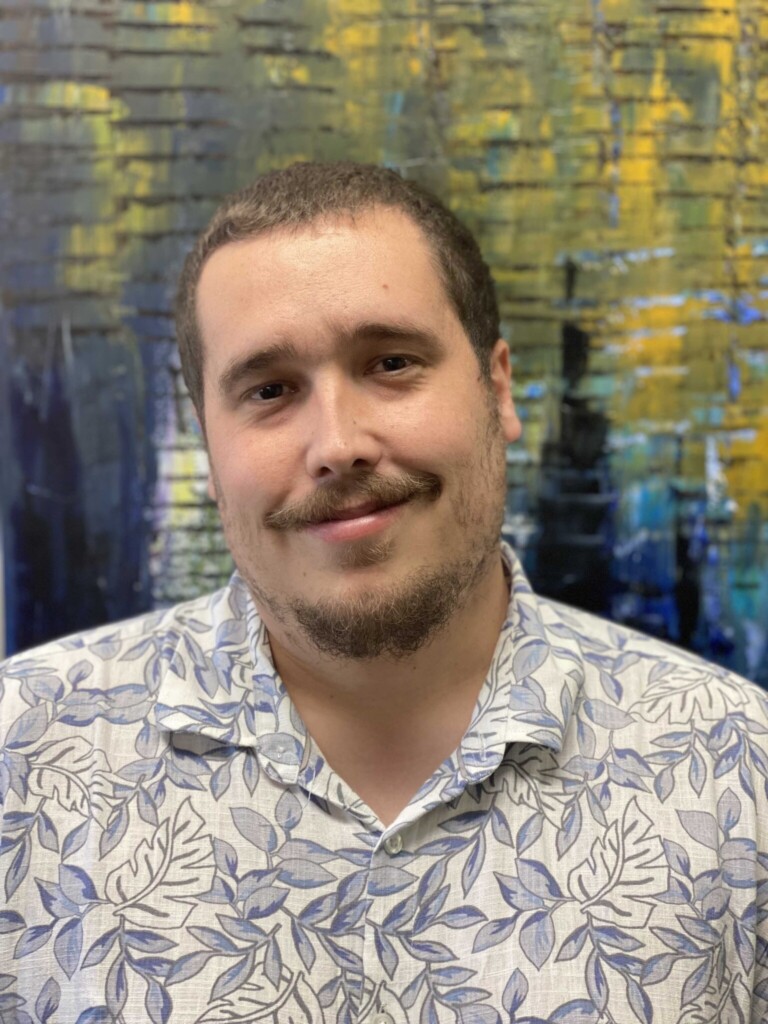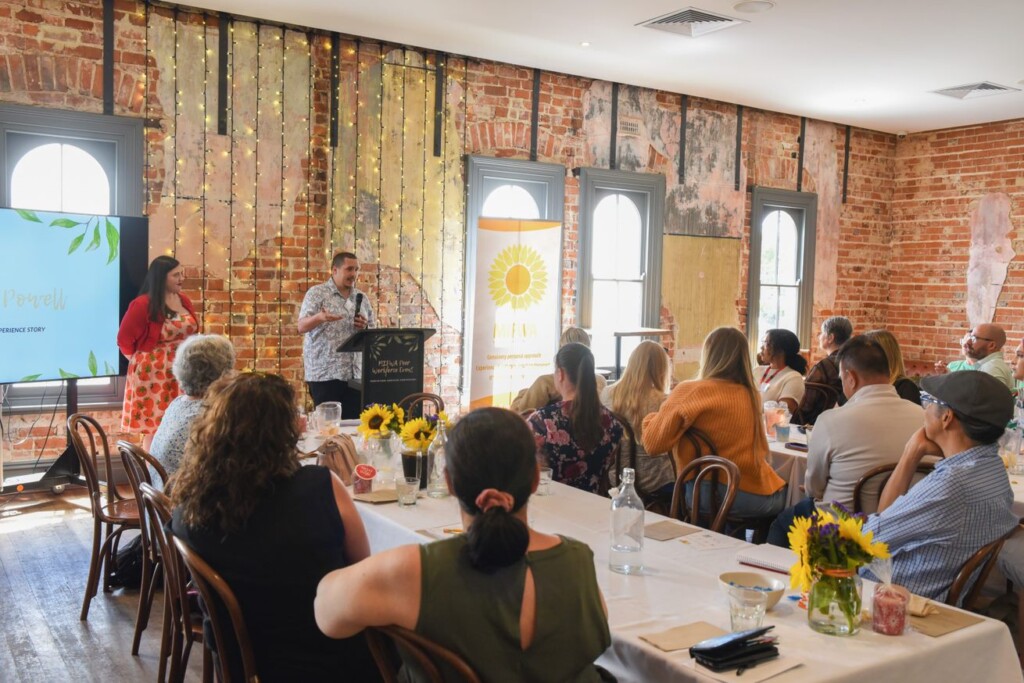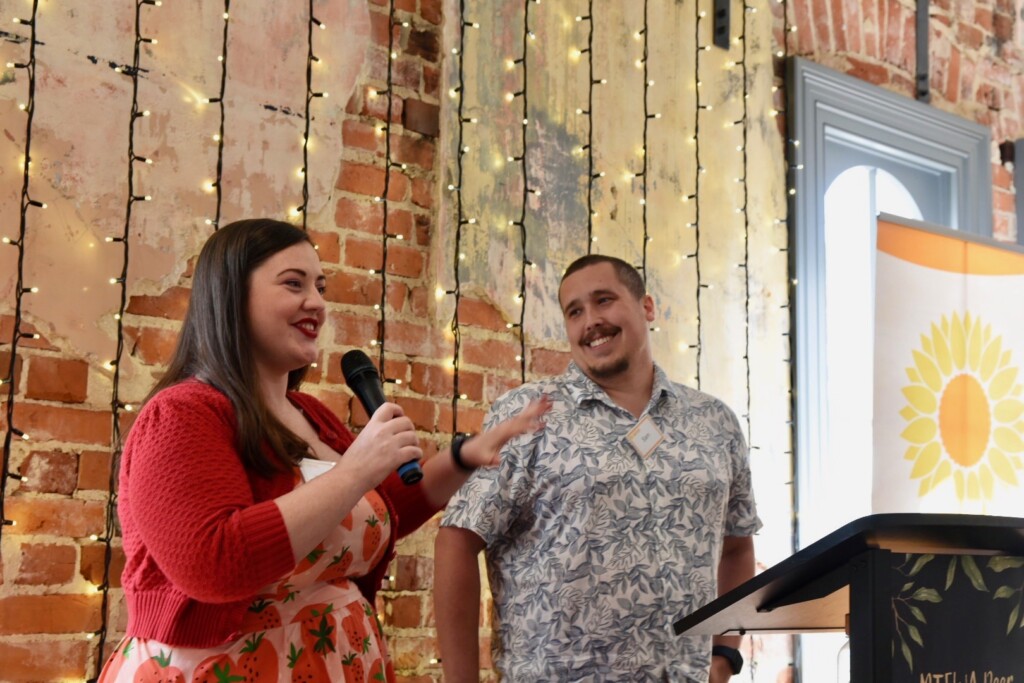
Sam, a 36-year-old dad to two beautiful girls, shares his experiences of receiving peer support through our Hospital to Home program for people returning home after a hospital stay following a mental distress.
During the program, Sam developed a connection with his peer worker who supported him in setting goals and finding confidence and hope for his recovery. Now he’s helping others achieve the same.
I was moved around a lot when I was a kid. When I was seven, my dad got a job at NATO in Belgium, so I spent a good chunk of my childhood there. The advantage was I got to see a huge amount of Europe as a kid, memories that I will always enjoy. However, being moved so frequently meant I found it hard to maintain friend groups and close connections.
I’m now working as a peer worker while studying a Certificate IV in Mental Health. It’s a real challenge and my anxiety is not helping. But I’m achieving my TAFE goals and I have never been happier at work. In fact, I feel I have found the job I was meant to do!
“It’s taking me a good deal of reflection and looking back on my past events to realise I had been suffering from terrible burn out.”
A little bit about my hobbies: I’m an avid gamer and love nothing more than getting lost in a good fantasy world. I also love dragging my daughters on walks, although at times they would often prefer to go to the playground. On Thursday nights, I run a Dungeons & Dragons group, something I started doing as a way to connect with people for my mental health. It’s a dream of mine that once I finish TAFE and have the time, I would use Dungeons & Dragons as a mental health recovery tool to help others the way it has helped me.
It’s taking me a good deal of reflection and looking back on my past events to realise I had been suffering from terrible burn out. I was a manager at one of the big supermarkets and I was working nonstop six days a week. Normally around 13 hours a day, with some of those hours being unpaid. I would come home completely exhausted, which took its toll on my home life.
I struggled to say no to my managers, as most of them were men who I had a really hard time speaking to due to trauma that I experienced with my dad when I was little.
Due to the burn out, my anxiety and depression became too much. I did the ‘man thing’ of ignoring my health as I felt I was supposed to be strong. Then my home life fell apart. My marriage ending was the straw that broke the camel’s back. Everything I had been holding back burst and I ended up in hospital because I tried to harm myself.

Inspiring the MIFWA team
Connecting with MIFWA’s Hospital to Home
Hospital was good for me. I engaged with the nurses and an occupational therapist. I felt calm for the first time in a long time. It was the hospital that arranged for me to connect with a peer worker in the Hospital to Home program. At the time, I had no idea what a peer was or did, but I was willing to try anything to change my situation. I was told by the hospital staff that I would meet someone who could help me when I got out of hospital. I remember being told that the peer worker would be able to support me when going back out into the world.
“I’m so glad I decided to accept the support, as meeting [my peer worker] was the start of an amazing journey of recovery for me.”
Once I left hospital, I was stuck in bed for a long time. The thought of getting out of bed wasn’t even on my mind. Not until my peer worker met with me. I told her I was struggling to leave my bed, so she arranged to meet me early in the mornings for coffee. It was such a small thing, but it got me out of bed and engaging with the world again. I’m so glad I decided to accept the support, as meeting her was the start of an amazing journey of recovery for me.
Before I met my peer worker, two MIFWA peer workers visited me at home. They sat with me and asked me about myself and what I had been through. From my answers, they matched me with a peer worker from MIFWA’s Hospital to Home program.
I really liked the flexibility and different options I was given in this process. This was important to me, as I still had some trauma connected to males in leadership roles. I was allowed to request a female worker.
“I just felt, for the first time in my life, like someone understood me, and it made me feel less alone and more like a person.”
About a week later, I met my peer worker for the first time. We met at a café and talked a bit about of everything. One of the main things we talked about was how isolated I had become from society and how upsetting this was for me. I kind of realised I had no friends or any idea of how to make friends. We also talked about my anxiety, how it played into all these aspects of my life and how limited I was in what I could do because of it.
I found my peer worker really easy to talk to. I just felt, for the first time in my life, like someone understood me, and it made me feel less alone and more like a person.
The impact of peer support
The main thing my peer worker helped me with was getting me out of the house and engaging with my community. They introduced me to MIFWA’s My Recovery group. I was anxious about going, but with their encouragement I went and I’m so glad I did.
“I gained a sense of self and a drive to keep taking those small steps.”
The strength of My Recovery was the ability to openly share with the people in the group. I gained a sense of self and a drive to keep taking those small steps. I’ve gained friends and the ability to advocate for myself.
My peer worker got me out walking in nature again and gave me a few ideas on clubs to look into. They also helped me to set two main goals. The first was to try and get out of bed at a reasonable time. This took me some time, but I took the examples they had given me and began setting my appointments for early in the mornings. So, on those days I did get up and out of the house. This was a good start for me, and on the days when I didn’t have an appointment it became a little easier each day to get up.
The second goal was for me to reconnect with people and meet new people. I did this by first going to the My Recovery group with my peer worker’s support and encouragement, and when I found that to be enjoyable and exciting, I was able to push harder and join a Dungeons & Dragons group that I’m still a part of today and through which I have made some amazing friends. Joining the Dungeons & Dragons group was a huge achievement for me. I don’t think it would have been possible without first being encouraged to join the My Recovery group, as it showed me I was capable of going out and participating in groups.
The biggest impact of peer support
Through Hospital to Home, I got my drive back and stopped feeling so stuck. I was able to stop working in retail, which is something I thought I would be stuck in forever. I wanted to use my skills in a different way. The biggest impact of peer support on my life was me falling in love with the peer profession. Knowing that someone else had a lived experience and could use it in a positive way truly inspired me. I knew then that I wanted to do the same for others. It required me to undertake a lot of work on my own recovery to get to where I felt I was ready, but I can proudly say I achieved it and I’m now helping others the way I was helped by my peer.
“The biggest impact of peer support on my life was me falling in love with the peer profession. Knowing that someone else had a lived experience and could use it in a positive way truly inspired me.”

Sam with Hayley, our Lived Experience (Peer) Lead
What makes a great peer worker
In my opinion, the qualities that make a good peer worker are empathy and the ability to listen to the person they are helping. Being able to not judge people based off their experiences is also extremely important. Most people out there just see the mental health issues and not the person behind those issues, whereas a peer worker can see the person behind.
To be seen is such a powerful thing.
What’s next for me
Going to TAFE is a big one for me. I have never seen myself as a school sort of person, but I learned I could challenge the way I see myself and that I’m able to do more than I know. I don’t think I would have realised this if I hadn’t had that support getting out of bed and meeting new people.
Ask for help
I know it’s scary especially where change is concerned, but just think about peer support like you’re going to see a good friend who you can talk openly with and there’s no need for secrets between the two of you.
It’s hard to put into words, but I get to be myself again and I like myself. It’s something I lost along the way without realising it. When I found it again through my support, it was like I was awake again and getting to experience life without feeling numb to it.
As I mentioned earlier, until I became unwell and needed support, I had no idea peer support was a thing. I think this was because mental health is still such a taboo topic in the mainstream, and unfortunately is still looked down on in some areas.
I believe it takes people like you and I talking openly and honestly about our experiences to change this. In my opinion, peer workers are also essential in changing this view. Things are slowly improving, but we still have a long way to go.
I wake up each day now excited for what’s to come.
Read more about Hospital to Home.
Share

